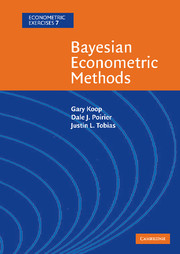Book contents
- Frontmatter
- Contents
- List of exercises
- Preface to the series
- Preface
- 1 The subjective interpretation of probability
- 2 Bayesian inference
- 3 Point estimation
- 4 Frequentist properties of Bayesian estimators
- 5 Interval estimation
- 6 Hypothesis testing
- 7 Prediction
- 8 Choice of prior
- 9 Asymptotic Bayes
- 10 The linear regression model
- 11 Basics of Bayesian computation
- 12 Hierarchical models
- 13 The linear regression model with general covariance matrix
- 14 Latent variable models
- 15 Mixture models
- 16 Bayesian model averaging and selection
- 17 Some stationary time series models
- 18 Some nonstationary time series models
- Appendix
- Bibliography
- Index
1 - The subjective interpretation of probability
Published online by Cambridge University Press: 05 June 2012
- Frontmatter
- Contents
- List of exercises
- Preface to the series
- Preface
- 1 The subjective interpretation of probability
- 2 Bayesian inference
- 3 Point estimation
- 4 Frequentist properties of Bayesian estimators
- 5 Interval estimation
- 6 Hypothesis testing
- 7 Prediction
- 8 Choice of prior
- 9 Asymptotic Bayes
- 10 The linear regression model
- 11 Basics of Bayesian computation
- 12 Hierarchical models
- 13 The linear regression model with general covariance matrix
- 14 Latent variable models
- 15 Mixture models
- 16 Bayesian model averaging and selection
- 17 Some stationary time series models
- 18 Some nonstationary time series models
- Appendix
- Bibliography
- Index
Summary
Reverend Thomas Bayes (born circa 1702; died 1761) was the oldest son of Reverend Joshua Bayes, who was one of the first ordained nonconformist ministers in England. Relatively little is known about the personal life of Thomas Bayes. Although he was elected a Fellow of the Royal Society in 1742, his only known mathematical works are two articles published posthumously by his friend Richard Price in 1763. The first dealt with the divergence of the Stirling series, and the second, “An Essay Toward Solving a Problem in the Doctrine of Chances,” is the basis of the paradigm of statistics named for him. His ideas appear to have been independently developed by James Bernoulli in 1713, also published posthumously, and later popularized independently by Pierre Laplace in 1774. In their comprehensive treatise, Bernardo and Smith (1994, p. 4) offer the following summarization of Bayesian statistics:
Bayesian Statistics offers a rationalist theory of personalistic beliefs in contexts of uncertainty, with the central aim of characterizing how an individual should act in order to avoid certain kinds of undesirable behavioral inconsistencies. The theory establishes that expected utility maximization provides the basis for rational decision making and that Bayes' Theorem provides the key to the ways in which beliefs should fit together in the light of changing evidence. The goal, in effect, is to establish rules and procedures for individuals concerned with disciplined uncertainty accounting. […]
- Type
- Chapter
- Information
- Bayesian Econometric Methods , pp. 1 - 10Publisher: Cambridge University PressPrint publication year: 2007



